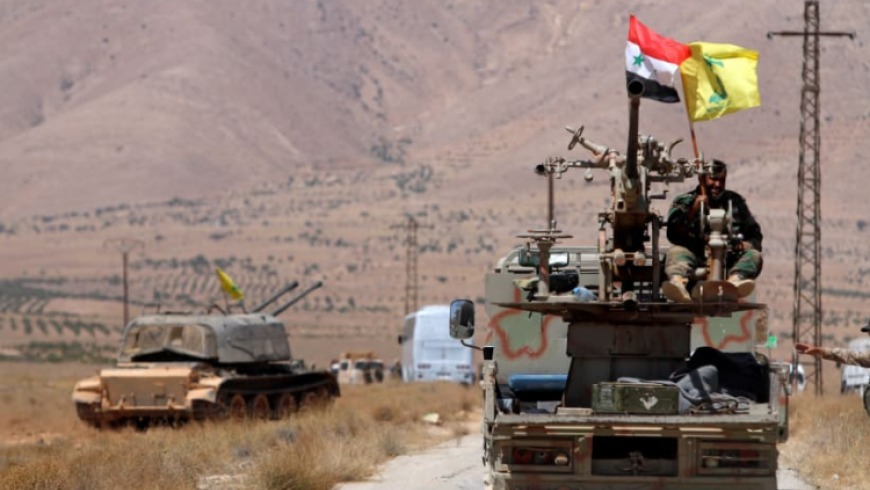
A significant portion of the recalled forces belong to Hezbollah’s elite “Radwan Unit”
In a strategic shift following recent Israeli cyber and military attacks, Hezbollah has begun withdrawing key units, including elite forces and special operations teams, from Syria and other Arab countries to bolster its front in southern Lebanon. The move, confirmed by multiple military and security sources, reflects the group’s escalating preparations for a potential confrontation with Israel.
Hezbollah’s recall from Syria reportedly included forces stationed in critical provinces such as Aleppo, Deir Ezzor, and sectors of the Syrian Badia. In a notable development, Hezbollah troops have redeployed to positions they had vacated earlier in 2024, with several barracks and independent sites in southern Syria seeing a renewed Hezbollah presence.
A circular issued in early September instructed Hezbollah’s units in Syria to increase readiness and prepare for redeployment to unspecified locations. By mid-September, members operating in Syria were directed to hand over their responsibilities to Syrian regime forces. These units, concentrated in Qusayr and Zabadani, were instructed to prepare for relocation to southern Lebanon, signalling a clear shift in Hezbollah’s military priorities.
Withdrawal of the “Radwan” Elite Forces
A significant portion of the recalled forces belong to Hezbollah’s elite “Radwan Unit,” renowned for its role in direct military engagements and regarded as the spearhead of Hezbollah’s military operations. By Sunday evening, over 700 fighters had returned to Lebanon, with around two-thirds transported covertly through Hezbollah-controlled smuggling routes near Damascus. The remaining fighters reentered Lebanon via legal border crossings, using civilian vehicles to avoid detection by Israeli drones patrolling the area.
The “Radwan Unit,” which has been stationed in Qusayr, Zabadani, and the Qalamoun region, is pivotal in Hezbollah’s combat strategy. Its members have trained in specialized camps in the Damascus and Homs countryside. Their withdrawal underscores Hezbollah’s focus on fortifying its positions along the volatile Lebanese-Israeli border.
Leadership Mobilization from Iraq and Yemen
Hezbollah’s mobilization efforts extend beyond Syria. Sources report that senior cadres and military trainers from Iraq and Yemen have also been recalled to Lebanon. These include specialists in drone operations, missile systems, and chemical weapons, many of whom had been training militias like the Yemeni Ansar Allah (Houthi) forces in recent years. Hezbollah operatives had been instrumental in assisting these militias in developing advanced weaponry, including anti-armor and thermal-guided missile systems.
This mobilization marks a critical step in Hezbollah’s broader strategy, particularly as tensions on the Lebanese-Israeli border continue to mount. The presence of these seasoned cadres on Lebanese soil enhances Hezbollah’s operational capabilities, especially in the event of a military escalation with Israel.
Iraqi Militias Filling the Void
To fill the vacuum left by Hezbollah’s partial withdrawal from Syria, Iraqi militia fighters have been deployed to critical areas. Over 150 Iraqi fighters arrived in the Syrian Badia and the eastern and southern Homs countryside over the weekend. It remains unclear whether these militias will remain stationed in Syria or eventually transfer to Lebanon to support Hezbollah’s operations.
This shifting dynamic comes amid ongoing efforts by the Syrian regime, Hezbollah, and Iran’s Revolutionary Guard to maintain a foothold in Syria, even as Hezbollah reallocates resources to Lebanon. The training of Yemeni militia forces on Syrian soil, which has been ongoing for several years, underscores Syria’s role as a key logistical hub for Hezbollah’s regional operations.
A New Phase of Military Realignment
Hezbollah’s redeployment of elite forces from Syria signals a critical phase in its military strategy, with the group preparing for a possible conflict with Israel. This shift comes at a time of heightened regional tension, with Israel’s increased military activity and cyberattacks on Hezbollah positions adding to the sense of urgency.
While Hezbollah’s withdrawal from Syria may seem like a tactical retreat, the redeployment of its most battle-hardened forces to Lebanon is a clear indication that the group is preparing for a larger confrontation. As Iraqi militias fill the void left by Hezbollah in Syria, the reshuffling of forces across multiple fronts reveals the complexity of Hezbollah’s military realignment in response to growing threats in Lebanon.
